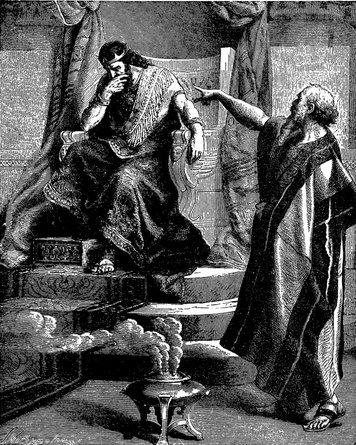
Nathan is mentioned many times throughout the Books of Samuel, Kings, and Chronicles – mainly during the darkest and most troubled times of King David’s reign. We first meet him in 2 Samuel 7:2 when David told the prophet of his desire to build a temple for God. At first Nathan encouraged the king, but we are told that later that night God spoke to Nathan, telling him in detail why he would not accept a temple built by David, stressing that David had shed much blood (1 Chronicles 28:3).
It was not a flattering message to have to relay, but we see something of Nathan’s character in that he did not attempt to smooth over the reason for God’s refusal of David (or to cover the fact that he himself had been wrong to originally encourage the king) – we are specifically told that “Nathan reported to David all the words of this entire revelation” (2 Samuel 7:17, emphasis added).
Later, Nathan had to confront David with the king’s sins of adultery with Bathsheba and of having her husband Uriah killed (2 Samuel 12:1-15). Considering the fact that David had already killed to hide this situation, we see Nathan’s tremendous strength of character and faith in boldly accusing the king. Nathan not only accused David as God had commanded him to do, but also predicted that David’s first child by Bathsheba would die, and that the king would suffer great anguish as a result of the actions of his own family members.
Close to the end of David’s life, Nathan related to David the news of his son Adonijah’s plan to seize the throne. In this way the prophet skillfully enabled the hasty coronation of David’s chosen heir – Solomon.
Nathan was not simply a bringer of bad news, however. He also encouraged the king and informed David that his throne would be established forever (1 Chronicles 17:1-15). He was clearly a trusted advisor throughout his service to the king and a man of important accomplishments. There appears to have been a book written either by Nathan himself or about his service as a prophet (1 Chronicles 29:29), and Nathan apparently wrote a history of King Solomon along with two others (2 Chronicles 9:29).
But Nathan’s major accomplishment was undoubtedly the true faith he repeatedly showed in expressing tough love for David and confronting the king with his errors. Nathan’s character and faithfulness in conveying the word of God, no matter how negative the message sometimes may have seemed, obviously gained him the respect of Israel’s greatest king. True to his name, the prophet surely was a “Gift of God” to David in helping him to correct his course when he went astray (for example, Psalm 51) – something the king must surely have appreciated over time.
In fact, it is doubtless a sign of David’s respect and love for Nathan that the king named his third son after the prophet (1 Chronicles 3:5). And it is through that Nathan – not Solomon or any of David’s other powerful sons – that Jesus Christ was descended (Luke 3:31).
The prophet Nathan served in a “behind the scenes” career, but one which had a tremendous effect for good. He is an example to all of us of the value of truth spoken in love, and of faith in dealing with difficult situations concerning those we strive to serve.
 RSS Feed
RSS Feed
